
|
|
Jellyfish Can't The Swim In The Night
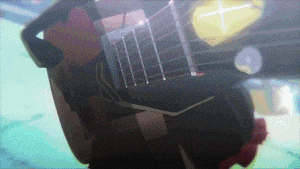 Straight folks need not apply. To echo the sentiments of one of my closest friends, I've been trying to watch less anime about kids in school lately. This is partly because I'm an adult far removed from school, making it even less interesting as a setting now than when I was a kid, but also because - even for anime that are really good - it kind of stings watching kid characters live through adventures and opportunities that I missed out on growing up. I mean, I never got to go on a life-changing field trip or had a heartstring-strumming schoolyard crush or became the rising star of an underdog tale or got killed in a freak accident and woke up in a JRPG fantasy world where I suddenly gained tremendous and heavily gimmicked skills. Being reminded of these sorts of things every time I boot up a school-flavored anime just gets a little grating after a while. But on the other hand, I'm also trying not to dwell too much on the past, and I should know better than to let my own hang-ups about my mediocre and heavily sheltered childhood get in the way of enjoying someone else's story, or living vicariously through their successes.
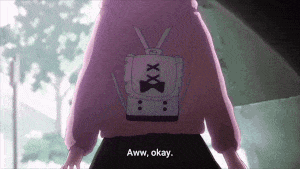 Oh, did you think I was kidding about the "straight folks need not apply" bit? Jellyfish Can't Swim In The Night is an original anime series following the lives of four high school girls who come together to form a collaborative music and visual supergroup (aptly named "JELEE"). It's fair to label this as a "music anime", but it deviates from the usual narrative structure of one, and rather than focus on the interpersonal drama of the band or their subsequent quest to make it big, the show decidedly revolves around the girls' individual quests for identity instead. Each character is struggling with some form of negative self-image, and uses JELEE as a catalyst for finding purpose, meaning, or direction in life, and the myriad ways in which they rely on and inspire each other through their socially awkward teenage years is what actually forms the core of the show. On top of that, it's also about the human need to create art, especially in the here and now of 2024. In our current age of social media-influenced artificial generation (using so-called "AI" programs to auto-generate muddled stories, art, and now even attempted music and music videos), Jellyfish challenges the paradigm of "creating content" by tapping into the true purpose of art itself. The anime asks you to observe not only WHAT the characters are making - and the difficulties they face in making it together - but WHY it matters that they're even making it in the first place, and what deeper needs they satisfy by doing so. And because I can't stress it enough, the show is unequivocally - and all but explicitly - queer as fuck.
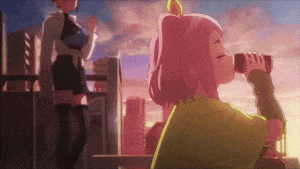 I'm not talking about surface-level implied schoolgirl GL shit here. My gaydar was going absolutely fucking haywire the entire time. Like any capital-M Music Anime, the episode-to-episode plot details JELEE's quick rise to Five Minutes of Fame in their seemingly arbitrary quest to reach 100K followers on social media via their unique animated music videos. Each of the group's four members brings their own set of skills to the project, encompassing the entire production process, from writing lyrics, arranging and recording the music, singing, creating characters and visuals for the accompanying video, adding animation and video effects, and promoting it via livestreams. As someone with half a foot in that world myself, I was surprised by how deeply steeped in VTuber and online collaboration culture the show is. The writers very clearly did their homework. As I mentioned though, that process and even the music itself is really more of a B-plot to the show. The center stage spotlight shines squarely on each character's personal journey to discover why they felt so drawn to this project, and why it suddenly matters so much every time an extenuating factor or nascent personal drama threatens to break up the band. I've had a lot of difficulty putting all of my thoughts into words for this review, so in the interest of saying something worth writing, I'm going to gloss over most of the actual story details, and trust that you'll just watch the series for yourself should this Review intrigue you.
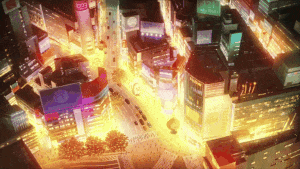 The frequent use of bustling city shots to transition between scenes really helps convey a sense of controversy, highlighting each character's zeal for the project, as well as their anxities and insecurities. The core question Jellyfish keeps asking of its cast is: "Who are you creating for?". Here in the real world, a majority of people create with the intent of sharing their work online, whether as part of a community (i.e. a fandom, followers of a popular YouTuber or Twitch personality, a subreddit, etc) or in hopes of establishing themselves as a content creator. By that measure, most people seek to create things that they can be certain other people will enjoy. I always see them running polls for their followers, asking which pop culture character they should draw next, or what new show they should react to, or what game they should play. In many ways, it makes them seem obligated to create for the appreciation of their audience above all else. The downside to this is that while they are engaging with and building a community, it dilutes their body of work into a lowest common denominator slurry of low-hanging fruit. Anyone can draw Princess Peach's new outfit or react to the new Scott Pilgrim anime or whatever. What they've gained by catering to their community comes at the loss of establishing their own individual identity. I'm not saying it's a bad thing to engage in community or even to make the art that will guarantee sales - believe me, I KNOW being self-indulgent generally does not gain you any followers - but if you never take time to carve out your own identity by creating what YOU want to create, your work becomes just another bucket of water in a sea of online content.
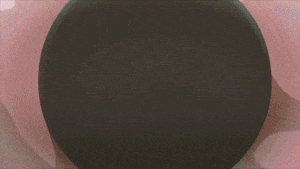 Characters saying one thing while doing the opposite is a common recurring theme here, showcasing those feelings of inadequacy and imposter syndrome that so many of us - creatives especially - deal with every day. Jellyfish explores this conundrum primarily through its two unofficial main characters, Mahiru and Kano. Forming the core of JELEE, they both struggle openly with this question of who they create for, and walk in nearly opposing circles trying to figure it out. A former idol singer disgracefully ejected from the scene after getting in a physical altercation with one of her bandmates, Kano loses her drive to ever sing again until her chance encounter with self-denying artist Mahiru. Inspired by her work and determined not to let others talk shit about it, Kano uses her newfound friendship and natural chemistry with Mahiru as a reason to sing again, eager to impress and motivate her new would-be girlfriend into creating something new with her. Likewise, Mahiru's distaste for her own art stems from a formative experience with her childhood friends, roasting an unusually colorful mural of a jellyfish painted on a brick wall downtown, not knowing that Mahiru was the actual artist. Hearing Kano's genuine praise for the boldness and originality of her work reignites that passion to create again, this time with a renewed focus on taking art lessons and improving her fundamentals in service of JELEE's music videos. However, this is only where the struggle begins for her. Even though her art becomes more established, she still finds that she doesn't *like* her art, and can't place why. She's regained her passion, but remains unsure of who she's creating for.
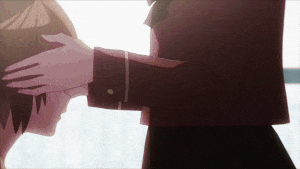 Sometimes you just gotta put your friend's head in your crotch and give them a pep talk about self-image. You know, as a friend. Unlearning to hate her own work because of what others said about it, and being able to take pride in the weird elements that give it its inimitably colorful flair is something that takes Mahiru nearly the entire series to finally click with. After an attempt to prove to herself that studying basics and taking a professional commission was the correct move over simply being self-indulgent with JELEE, she ends up scrapping the designs she was asked to create, and in true punk rock fashion, instead turns in a design entirely of her own style, completely different than ordered, but authentic to her own aesthetic. In many ways, Mahiru really embodies the entire spirit of the anime. This punk attitude and refusal to conform is reinforced by VTuber and video editor Kiui's side of the story. Shamed in middle school for still liking superheroes and acting like a typical shounen protagonist (her natural default personality), she drops out of school and hides behind her VTuber identity to create a version of herself that she can enjoy being. When later confronted by her former schoolmates about it, Kiui unleashes years' worth of pent-up rage in an absolutely visceral retort, proclaiming that she loves who she is now, and that in reality, she never changed, despite everyone in her life pressuring her to do so. And while she denies being explicitly trans, her VTuber persona is male, and her speech absolutely hits on the same emotional cues that being genderqueer does, at least for me.
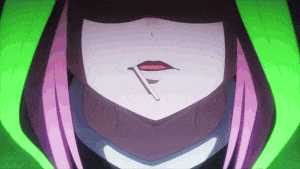 The show really goes the extra mile in terms of small details too, like the accurate Twitch chat messages. Strangely enough, Kiui is probably the most understatedly queer of the group - given how visibly lovey-dovey the other three are - but it's the other details surrounding her story arc that really sell it for me. Kiui is the least attached member of JELEE, and despite her reclusive night owl gamer lifestyle, she actually has the most tempered and realistic outlook of the entire group. Already equipped with a backup plan in case VTubing ever goes south, Kiui enrolls in a motorcycle driving class so she can take part time delivery jobs, and also because riding a motorcycle seems like a cool thing to do. An older woman at the driving course even makes a move to hit on her, proving I'm not the only one who sees it. Kano also joins in on the motorcycle lessons, looking for additional fulfillment while Mahiru is locked in on her art study. After a rocky start, she walks away from the course holding her license proudly, only to realize that she has no idea what to actually do with her newfound freedom. And yet, like a complete dork-ass badass, she decides to stop by Mahiru's school to pick her up, just to give her a ride to nowhere in particular. They end up spending the evening at the beach together and dropping some heavy confessions during their conversation (which I know some people will insist are "just how girls talk to each other", but come on, you're not fooling anybody).
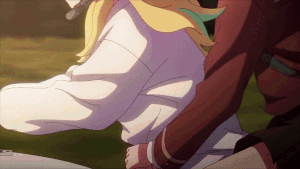 Genuinely hard to think of something more classically lesbian than this. This is all not to mention the fourth member of the group, the born-rich piano prodigy, Mei. Drawn to the group by sheer virtue of being an obsessive fan of Kano's former idol personality - and still openly making heart eyes at her every move - Mei joins the group bills-first by inserting an excessively generous tip into the jar, and wowing the others with her piano arrangement skills. Mei makes for an interesting character who flips the expectations for The Rich Kid, in that she appears neat and proper and clearly well-off, but rather than a stuffy uptight perfectionist, is just as awkward and emotionally flummoxed as the rest of them. Given her explicit drooling, it should be pretty obvious what inspires Mei to create. Making music with JELEE isn't even much of a passion for Mei, so much as it is a vehicle for spending time in the presence of her crush. Initially, playing piano was just a skill her parents pushed her toward, which she learned to perform flawlessly simply because she was told to do so. But growing up somewhat isolated from her peers, it wasn't until Kano spoke to her at a post-concert meetup during her idol days that Mei felt she had truly connected with someone. And it isn't until Kano's own unresolved mama drama threatens to tear her away from JELEE that things really click for Mei. Because of the ways it brought her and Kano together, the music suddenly has meaning to her, and the thought of losing that leads to one of the most impactful and memorable moments of the entire series, when Mei reveals - during a live premiere, no less - why she only plays piano and never sings.
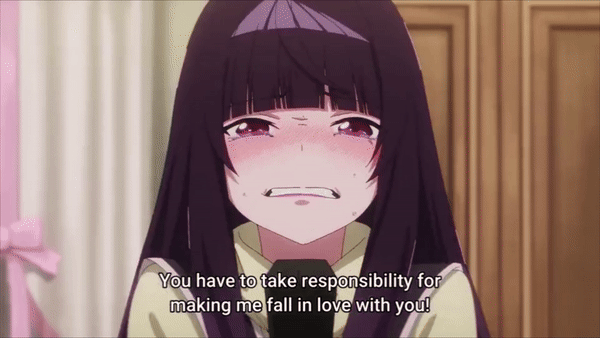 Easily one of the show's rawest, most human moments, only made possible by endeavoring to create something and then messing it up in the ugliest, most heartfelt way possible. So, even aside from the more overt examples, like Mei "accidentally" booking a weekend at a love hotel for the group to brainstorm on a new song, or Kano capping off the New Year's festival by giving Mahiru a little peck on the cheek, or Kiui and Kano gawking at their new motorcycle-driving lesbian friend's one-million-yen boob job (no, I'm not exaggerating that part), I hope I've made it clear how blatant the queer themes of this show stand out. You could very easily win a round of Yuri Bingo with all the classic tropes that come up, but this show feels even smarter and more genuine than that. Because even moreso than it being about girls liking girls, it's about examining what drives people to create, and how relationships with others can inspire and reinforce that. It's a very thought-provoking story told through an overtly queer lens. This is all explained point-blank in the very first episode too, using the analogy of a jellyfish absorbing light from the sources around it before it can shine for itself, even at night. The characters literally cycle energy back and forth from one another so that they each can shine, and in doing so, kindle not only their underlying passions, but deeply meaningful relationships as well. And if that doesn't sound like the quintessential queer experience, I don't know what to tell you.
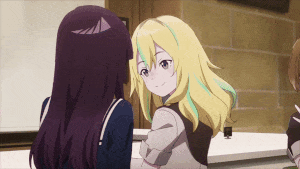 Kano's natural charisma makes her a great leader, but also provides a great mask for her deep-rooted insecurities. Needless to say, I absolutely adored this series. This review was difficult to write because so much of what I felt while watching it resonated on a deep, almost subconscious level for me. I can see some people being a bit put off by the show's unusual format for a Music Anime, and it definitely moves at a much faster pace than some of its contemporaries. Like a lot of other original anime titles this year, Jellyfish operates on an extremely tight budget for an extremely tight 12 episodes, leaving no room for expository monologues or recaps, so if it doesn't immediately click for you, you'll need to be an active listener and pay attention to keep up with what's going on at all times. I guess I should probably also mention, the animation and art direction for this series are fucking gorgeous. The production value is extremely high, and a lot scenes feel like the animators are just showing off for fun. This added a lot of additional flavor and character to an otherwise deeply introspective story, and helped keep me thorougly engaged with it the entire time.
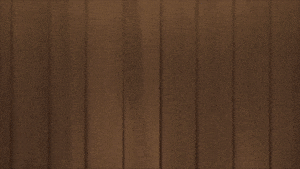 There's no reason for this cute little one-off scene to go this hard other than "wouldn't it be fun if it did though?" If you enjoyed Jellyfish Can't Swim In The Night, I would be hard-pressed to find a better follow-up rec than Carole & Tuesday. Both shows center around finding your passion through the joy of creation - especially that of music - and call on stunning art styles and animation to tell that story. For other modern shows about the joy of creation that don't center on music explicitly, try Keep Your Hands Off Eizouken (another high school story about the joy of animation) or Sugar Apple Fairy Tale (a fantasy about the joy of sugar sculpting). If you want a non-anime comparison, we have a surprising dearth of music-themed cartoons in the US, but Jem (and the Holograms) is a decent - although tonally different - place to start. I absolutely must also recommend the other famous Jellyfish-themed anime: Princess Jellyfish. The two shows are actually surprisingly simliar in vibe, the main difference being that Princess skews toward a slightly older audience, and revolves around a group of (what I'm going to refer to as) autistic young adults finding passion together through their respective hyperfixations and eccentric hobbies. Princess also uses a similarly unconventional story structure, and depends heavily on you investing your own feelings into it for its story to make sense.
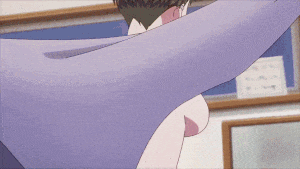 One more gif, just to REALLY prove my point here!
Lastly, not to pit bad bitches against each other, but Jellyfish was only ONE of the two music-themed original anime series of the Spring 2024 season. I do intend to have a review up for Girls Band Cry
|
|